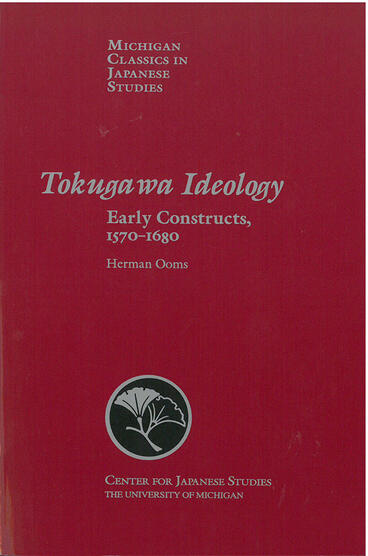Tokugawa Ideology
Early Constructs, 1570-1680
The classic study of seventeenth-century Japan.
Description
Relying on a broad range of theoretical writings on the problem of ideology the author has formulated their own interpretations of the formation of early Tokugawa ideology. Instead of synthesizing these theoretical approaches, he has worked them into analytical essays that constitute this book. The opening chapter, without being a theoretical discussion of ideology, offers some historical considerations. The purpose of this study is not to illustrate a single interpretation of ideology through a discussion of a particular historical period, but to come to an understanding of a specific historical discourse.The first chapter provides answers to the twin questions of locating a chronological beginning for the phenomenon under study and forming a proper vantage point for the exposition that follows. Chapters 2 and 3 trace the articulation of a new political discourse as predominantly a religious one that sacralized the rulers and the polity. Chapter 4 highlights the manifold manner whereby the Tokugawa bakufu was acquiring ideological significations. Chapter 5 makes a diachronic sweep of the institutional and ritual arrangements that affected a recentering of all public symbols around the new focus of power in Edo. Chapters 6 and 7 examine Yamazaki Ansai writings. The final chapter discusses the way in which the study reconstructs early Tokugawa ideology and the validity of the authors approach. [preface]
Herman Ooms is Professor of Japanese History, University of California at Los Angeles.
Reviews
"The single most important study of seventeenth-century thought in Japan to appear in any Western language, and quite possibly in any language."
--Peter Nosco, Harvard Journal of Asiatic Studies
"Ooms has produced a work impressive in its erudition, depth of scholarship, and theoretical exegesis. . . . Henceforth, no one can discuss Tokugawa thought or history without taking into account this provocative and challenging work."
--Mikiso Hane, American Historical Review
"A major achievement in either English or Japanese on early Tokugawa intellectual history. Ooms depicts from various perspectives the intellectual circumstances relating to Tokugawa rule by citing examples from Confucian, Buddhist, and tento¯ philosophy. It deserves the attention of those who are interested in political ideology, intellectual history, and Japanese culture."
--Hiroshi Watanabe, Journal of Asian Studies

